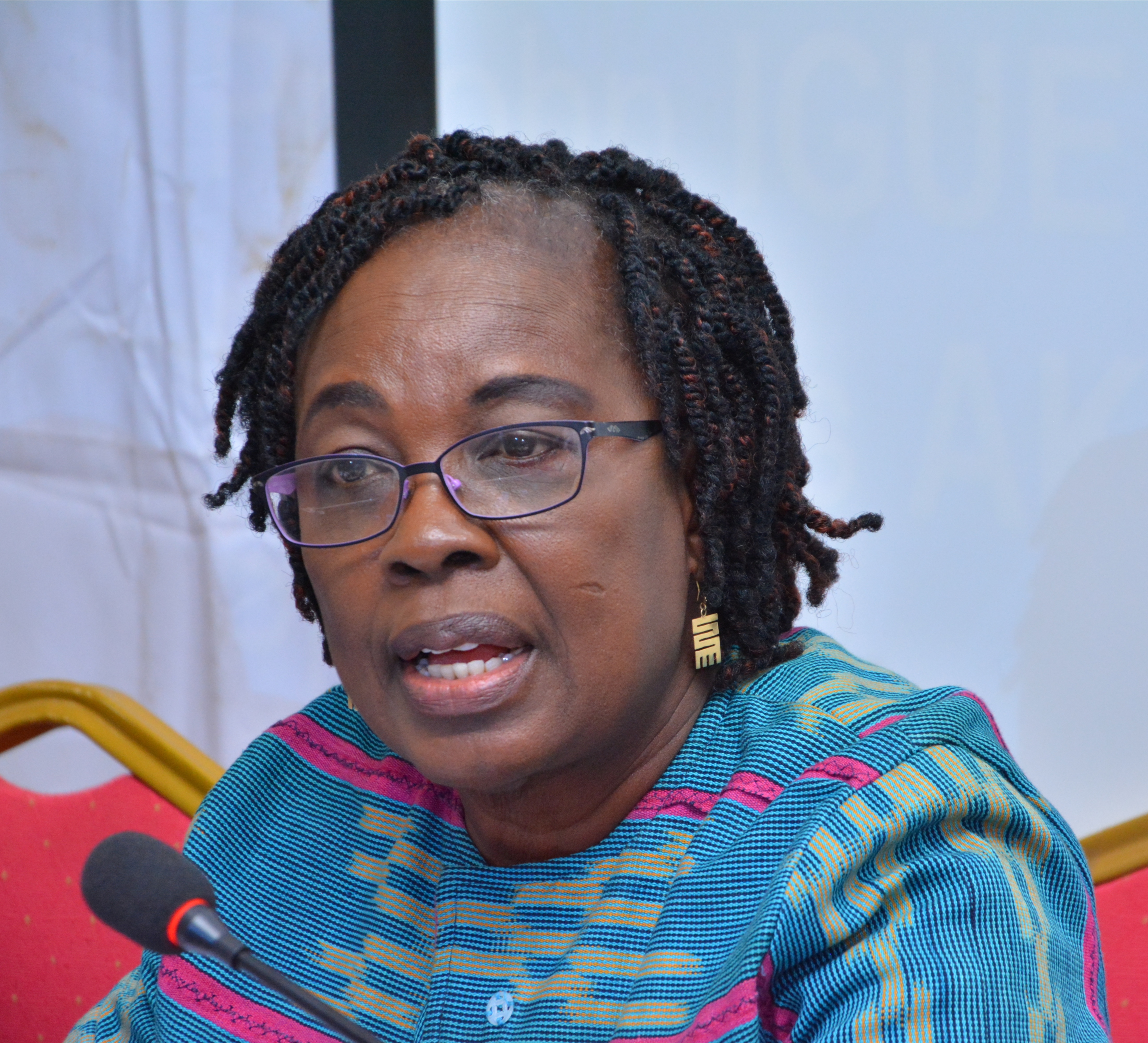Takyiwaa Manuh is Emerita Professor of African Studies at the University of Ghana.
She served as Director at the Social Development Policy Division of the United Nations Economic Commission for Africa in Ethiopia, and Professor of African Studies at the University of Ghana where she was also Director of the Institute of African Studies between 2002 and 2009. Her research interests are in African development; women’s rights and empowerment; contemporary African migrations, and African higher-education systems, and she has published widely in those areas. She has practiced as a lawyer and is active in the women’s movement in Ghana and Africa, and serves on the boards of several international, continental and national organizations.
As a first question, we’d be happy to get your take on the immediate consequences of COVID-19 in your neighbourhood and wider region, and your thoughts on whether this crisis can prompt a step-change in direction?
Pr Takyiwaa Manuh: The first few weeks were disorienting but the human condition means we have the capacity to adjust to so many things, doesn’t it? People have lived through worse times and worse conditions. Food systems have been holding up reasonably well, though there were really unreasonable price hikes at the beginning, but what we’re facing now are the usual seasonal shortages. Tomatoes were very expensive, but the prices are coming down. We depend a lot on imports of tomatoes from Burkina Faso, but with the borders shut from March 30th we depend now on local supplies. I learnt recently Ghana has the highest per capita consumption of tomatoes in the world, even beyond Italians! There are factories now producing tomato paste here in Ghana. So during this season, people are eating foods produced locally to a large extent. It’s more about transportation and other supply bottlenecks. A bigger question now is about how we improve agricultural production and storage to decrease food losses, so prices can be kept affordable.
Beyond the immediate personal, social and communal disruptions of COVID-19, I felt optimistic at first. It seemed like an opportunity to usher in a lot of changes in Ghana and across Africa. I am not sure I feel that optimistic anymore. The pandemic is now of unprecedented global dimensions. Perhaps the closest we have come to before was the Ebola crisis, though Ghana was not directly affected by this, but served as a major transit point for many UN operations in Sierra Leone, Liberia and Guinea. Then, the world looked on at what was essentially seen as an African problem. Today, this is clearly very different. Fortunately for us in Africa the spread of the disease has been, mild relative to experience in other parts of the world. But I use the word ‘fortunately’ because we are all aware of our fragile health services and our inability to cope with “normal epidemics,” let alone such a vicious pandemic. The numbers are low - this morning’s figures show we have just over 11,000 cases and only 58 deaths – but some people suspect we must be missing some deaths. The rate of infection has speeded up, with 500 new cases in 24 hours. The borders are still shut, but the partial lockdowns have been lifted. Schools are still closed, but universities just re-opened for final year students. Next week final year students in secondary schools and senior high schools are also going back, to allow them to take their final exams. But primary schools and the rest of secondary school students are still at home. We are now allowed gatherings of up to a hundred people, and the churches are re-opening. But with the rising number of cases they are making wearing of masks mandatory. However, there is still a large share of the population who don’t believe Covid-19 is real, despite the public health education.
There has been some disruption to food chains especially given the importance of the informal economy to so many people. The partial lockdowns were only in the two main regions, but these are the dominant regions so it had an effect throughout the country. The Ghana Statistical Service conducted a survey that used phone records to track disruptions to mobility. They showed people had really slowed down. The school closures have had a big impact, not only the added cost of childcare but many rely on the meals served in schools, or on cooked food served by vendors outside schools. In fact, schools had shut well before the lockdown, so it’s been three and half months that children have not been in school. All those small businesses focussed around schools – e.g., transportation and food preparation, have been badly affected – especially small and micro-businesses. Really immense impacts. Unlike in the UK or the US, when you’re unemployed here, you can’t file for benefits. Those kind of social protection mechanisms don’t exist. People aren’t being furloughed. If you’re in the formal sector, that’s different, but given that the majority of people are in the informal sector, they have been left entirely to their own devices.
What is your analysis of COVID-19 seen through the gender lens? What have been the gendered impacts of COV-19 in Ghana and elsewhere in Africa? Are there specific measures which target women and have been successful?
Pr Takyiwaa Manuh: During the lockdown there was some food relief for the very vulnerable, initially child and girl migrants from the northern regions of Ghana who predominantly work in markets, and often sleep outside on the streets. Many of the girls on the street have had babies, or live in very crowded conditions, so they were the focus of attention.
Initially the focus was on health dimensions, enough protective equipment for doctors, and beds for treating people. We have a Ministry for Gender, Children and Social Protection, but its understanding of gender and even social protection is very limited. There has been criticism of the lack of attention to gender issues and the need to think beyond the very limited social protection measures associated with the most vulnerable girls and young women in markets. There are also many child beggars who disappeared from the streets – was it their sponsors who supplied them with a meal a day? It is unknown.
The government’s attention has been more focused on the economy, and you hear very little about small traders and small holders who are the majority. The National Board for Small Scale Industries has obtained funds from the World Bank funded Corona virus Alleviation Programme, and is creating a fund for micro, small and medium enterprises. But they require a registration certificate and tax ID number, so it will not include the majority of enterprises in the informal sector. Thus it may turn out to be especially costly for women who never had much institutional credit. If they had food stocks they were going to cook, all of this has rotted. Nobody compensated them. So the pandemic has exposed the shabbiness of the social protection system which has been conceived in very narrow terms, and even for workers we don’t have unemployment benefits, except for those in the formal sector. But 80% of those employed are in the informal sector.
We’ve been very concerned about the gendered impacts of COVID-19. Government statements hardly mention gender, but mainly focus on the economy. It is expected for instance that GDP growth will fall from more than 6% this year to 2% and this will affect tax revenues, production, trade and commodity prices. Government speaks of these things as if there are no people who lie behind the changes, but just disembodied activities. But when you begin to disaggregate, say the tourism sector, which has been badly affected, you find the hotel industry, food chains, restaurants and catering establishments are run mainly by women, so there’s a disproportionate impact. With the borders closed, and restrictions on the number of people allowed to meet, conferences have been cancelled. Many women work in catering for schools, but that’s been wiped out too. It has been extremely costly for women. All their food stocks have rotted, and nobody is compensating them for that.
While COVID is expected to infect men more than women, most care work is done by women alongside looking after children who are out of school at home. I have been conducting interviews on Sexual and Gender Based Violence last week. Young girls complain that they wished they were back in school, rather than working from morning to night at home, while their brothers and male cousins are not expected to do domestic work. So school is seen as a place to escape to, rather than being at home where they are being asked to work incessantly. Here, the bulk of COVID patients are at home, not in in care homes, so the bulk of caring for them is done by women at home.
Hospitals have been overwhelmed and they’re not running normal services. Part of the main government hospital in Kumasi has been closed this week because of exposure to some positive cases. They have asked all the doctors and nurses in the unit to self-isolate, so people cannot access normal health services. Pregnant women fear going to hospital, given the risk of contracting the disease, and those who go to hospital encounter long waiting periods at the hospital.
The incidence of sexual and gender-based violence (SGBV) has risen during the lockdown, as people are locked in with their abusers. But it is difficult to get the actual figures, because formal reporting is very low. When you report you must get the hospital to fill out a medical report, which is needed as corroborating evidence for the court, but a fee is charged for this, in contravention of the Domestic violence Act. So while reported figures are had to come by, there is a lot of anecdotal evidence, for example with girls not being in school, that they are subject to higher risks of defilement and abuse.
Last week the President had scheduled a meeting with women’s groups, but it was cancelled at the last minute because of an emergency. From the government’s side, much of the focus at the meeting would have been on the fund set up for micro and small enterprises. So even when there is a focus on gender it tends to be on the economic aspects, and not on the human rights and bodily integrity of women, which are essentially considered as private matters. There is a Domestic Violence and Victim Support Unit (DOVVSU), but it does not operate in all the districts in Ghana and it faces several challenges, while the Domestic violence Act passed in 2007 is not adhered to fully. Access to justice for those violated is difficult. Some rights groups have been very active. I just read in the papers about a man who had defiled two schoolgirls in Kumbungu in Northern Ghana, and the group and the police had managed to get him to court, where he was convicted and sentenced, but you can be sure that for every one person sentenced there are another hundred or so where the case does not get any attention.
So civil society organisations have been more active than government in addressing the gendered dimensions of COVID-19?
Pr Takyiwaa Manuh: We have a Minister for Gender, Children and Social Protection. Her own understanding of gender issues is rather limited. She made it clear at the start of her tenure that she was more interested in children and social protection. But even then, her understanding of these is very limited. Livelihood Empowerment Against Poverty (LEAP) grants are given to some of the poorest households through the Ministry. So the focus appears to be more about money and patronage, rather than implementing policy and coordinating across sectors. When you have a Ministry whose own understanding is rather limited and also bureaucratic and where everything seems to be about funding, then you have a major problem. Of course, funding is important, but so is leadership and vision. There is a danger that some of the gains made could be eroded during these COVID times, especially the work with young adolescent women, which has not been operational during this time.
For government, as long as it can announce that it has set up a fund that will assist women alongside other micro, small and medium operators, that sounds like they are paying attention women and gender issues. And interestingly a breakdown of who sent in applications showed 41-59% in favour of women’s micro-enterprise activity. But it doesn’t follow that the funding will follow the same trend, and it is likely that women’s enterprises will receive smaller sums of money. So while the state thinks can tick the box for gender action, this would not include the majority of women in the market-place who run informal enterprises, and who do not have tax ID numbers or registered businesses.
So as I said, I started out being hopeful that massive changes and think-throughs might occur, but I am less so hopeful now. I had hoped there might be several needed social reforms. For instance, housing conditions for most people in urban and rual areas in Ghana make it impossible for them to socially distance. The majority live in compound houses, and share facilities with several other people.. Such a situation should have generated conversations about housing, water and sanitation, social security, etc,. given so many people have been left on their own. The trade unions speak up, but generally only about their own members, which are an ever-decreasing share of workers. This should be shaking us up, to tackle for instance the lack of potable water for millions of Ghanaians. But I need to add that the government has granted free water and electricity at half rates to households for 3 months (April-June). As part of temporary relief measures. .
But what are we learning from this crisis to put the needs of people on a new scale, how do we re-think to reform health services so they are sustainable, even for poor countries such as ours, to caters to the majority of the population and delivers adequate and quality services?
What were the local innovations in response to the crisis ?
Pr Takyiwaa Manuh: One good thing that has emerged is that some local industries have stepped up; for example a factory that produces alcoholic beverages not only for Ghana but also the Nigerian and some other West African markets started producing hand sanitisers, to meet shortages of hitherto imported products and growing demand. Other factories that produced clothing for export started producing masks and PPEs. So there are some opportunities which are being taken, but the question is, will these be sustained after the crisis?
Another interesting development has been the spate of innovation. Students, lecturers, ordinary people, have all been coming up with innovations. We have something in Ghana called Veronica buckets. The person who invented it worked in a hospital where there were no hand washing facilities. So she converted a covered plastic bucket into a container with a tap in the front. You fill it with water and put a basin underneath on a small table. You can then wash your hands under the tap and the waste water goes into the basin. Now people have come up with new types of Veronica buckets. Some people are using empty gasoline drums and connecting them directly to some source of water using piples. Some Veronica buckets are now solar powered and use sensors to dispense water and soap.
Other people have come up with prototype ventilators. Remember that there was much about ventilators a few months ago. So since nationally we had less than 200 ventilators, this goaded some lecturers and students in technical universities and even some individuals, to start producing some. And there has been no lack of ingenuity and invention.
My question again is this: how do we nurture this spirit of innovation and turn attention to different sectors of the economy, so we can become more self-sufficient and don’t have to import every little thing? Many people are asking themselves, with this spirit of can-do, how do we scale up and lessen our dependence ?
At the personal and national levels, there needs to be some introspection about values – what is important to us, what do we care about? All these things should lead to choices in national life. My fear is that we still not tackling deep seated issues. If we were to wake up on morning in September and the virus had gone away, would we be going back to our old way of doing things, with the World Bank and IMF still telling us what to do.
Many analysts and experts say that now is the time to rethink, accelerate Africa’s economic transformation. One of your area expertise is urbanization – how has the pandemic impacted those in slum areas with high density settlement. Will this crisis lead to rethink of Africa’s cities reconfiguration?
Pr Takyiwaa Manuh: The housing situation is very serious not only for slum dwellers but ordinary urban dwellers. We are asking people to wash their hands in homes where there is no running water. What kind of planning have we done to make sure that all homes are connected to a water system? Fecal matter also contributes to spread of COVID-19. It’s a recipe for disaster. The more you read about this disease you realize it will be with us for a very long time, it is not going away any time soon. But many policy makers are thinking, ‘here today, gone tomorrow’, instead of medium to long term thinking and planning. How should we plan if we assume this virus will be with us for a long time for housing, transportation and amenities in urban areas where the spread has been greater. It has been concentrated in urban areas. We must think and plan in a smarter way. My worry is we are not grabbing the few opportunities which exist. Some of the issues are not engaging the minds of bureaucrats. For me it adds up to the urgency of having an effective social security mechanism covering not just people in the formal sector, but the majority of the working population. If we break this down, inevitably women are in the lower end of earning range and will be more affected.
About the COVID-19 and Africa series: a series of conversations conducted by Dr. Folashadé Soulé and Dr. Camilla Toulmin with African/Africa-based economists and experts about their perspectives on economic transformation and how the COVID situation re-shapes the options and pathways for Africa’s development - in support of INET’s Commission on Global Economic Transformation (CGET)
Contact: [email protected]








